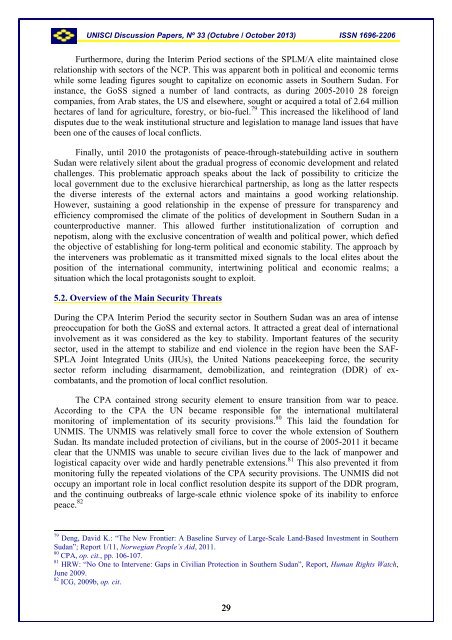UNISCI - Universidad Complutense de Madrid
UNISCI - Universidad Complutense de Madrid
UNISCI - Universidad Complutense de Madrid
Create successful ePaper yourself
Turn your PDF publications into a flip-book with our unique Google optimized e-Paper software.
<strong>UNISCI</strong> Discussion Papers, Nº 33 (Octubre / October 2013) ISSN 1696-2206Furthermore, during the Interim Period sections of the SPLM/A elite maintained closerelationship with sectors of the NCP. This was apparent both in political and economic termswhile some leading figures sought to capitalize on economic assets in Southern Sudan. Forinstance, the GoSS signed a number of land contracts, as during 2005-2010 28 foreigncompanies, from Arab states, the US and elsewhere, sought or acquired a total of 2.64 millionhectares of land for agriculture, forestry, or bio-fuel. 79 This increased the likelihood of landdisputes due to the weak institutional structure and legislation to manage land issues that havebeen one of the causes of local conflicts.Finally, until 2010 the protagonists of peace-through-statebuilding active in southernSudan were relatively silent about the gradual progress of economic <strong>de</strong>velopment and relatedchallenges. This problematic approach speaks about the lack of possibility to criticize thelocal government due to the exclusive hierarchical partnership, as long as the latter respectsthe diverse interests of the external actors and maintains a good working relationship.However, sustaining a good relationship in the expense of pressure for transparency an<strong>de</strong>fficiency compromised the climate of the politics of <strong>de</strong>velopment in Southern Sudan in acounterproductive manner. This allowed further institutionalization of corruption andnepotism, along with the exclusive concentration of wealth and political power, which <strong>de</strong>fiedthe objective of establishing for long-term political and economic stability. The approach bythe interveners was problematic as it transmitted mixed signals to the local elites about theposition of the international community, intertwining political and economic realms; asituation which the local protagonists sought to exploit.5.2. Overview of the Main Security ThreatsDuring the CPA Interim Period the security sector in Southern Sudan was an area of intensepreoccupation for both the GoSS and external actors. It attracted a great <strong>de</strong>al of internationalinvolvement as it was consi<strong>de</strong>red as the key to stability. Important features of the securitysector, used in the attempt to stabilize and end violence in the region have been the SAF-SPLA Joint Integrated Units (JIUs), the United Nations peacekeeping force, the securitysector reform including disarmament, <strong>de</strong>mobilization, and reintegration (DDR) of excombatants,and the promotion of local conflict resolution.The CPA contained strong security element to ensure transition from war to peace.According to the CPA the UN became responsible for the international multilateralmonitoring of implementation of its security provisions. 80 This laid the foundation forUNMIS. The UNMIS was relatively small force to cover the whole extension of SouthernSudan. Its mandate inclu<strong>de</strong>d protection of civilians, but in the course of 2005-2011 it becameclear that the UNMIS was unable to secure civilian lives due to the lack of manpower andlogistical capacity over wi<strong>de</strong> and hardly penetrable extensions. 81 This also prevented it frommonitoring fully the repeated violations of the CPA security provisions. The UNMIS did notoccupy an important role in local conflict resolution <strong>de</strong>spite its support of the DDR program,and the continuing outbreaks of large-scale ethnic violence spoke of its inability to enforcepeace. 8279 Deng, David K.: “The New Frontier: A Baseline Survey of Large-Scale Land-Based Investment in SouthernSudan”; Report 1/11, Norwegian People’s Aid, 2011.80 CPA, op. cit., pp. 106-107.81 HRW: “No One to Intervene: Gaps in Civilian Protection in Southern Sudan”, Report, Human Rights Watch,June 2009.82 ICG, 2009b, op. cit.29
















